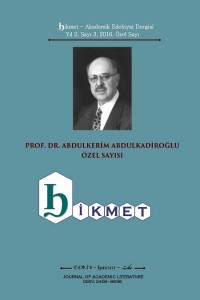Öz
"Elâ yâ eyyühe's-sâkî edir ke'sen ve nâvilhâ"
Ki ışk âsân nemûd evvel velî üftâd-ı müşkilhâ
This couplet is from the first ghazel in Hâfız-ı Şirazî (ö.
1389)'s Divan. İt is argued that the first line from the poem of
Yezid (ö. 683), the son of Muaviye:
Ene'l-mesmûmu mâ indî bi-tiryâkin velâ râkî
Elâ yâ eyyühe's-sâkî edir ke'sen ve nâvilhâ
It is understood that that is not true. In the same way,
Ottoman poets composed a lot of ghazals something like that.
Behiştî, Mirî, Zikrî, Sırrî, Sânî, Hisalî, Nimeti, Derviş and Hıfzî …
like Hâfız-ı Şirazî. Gelibolulu Mustafa Âlî and Yahya Bey wrote the
Arabic couplets in the same meaning. As a result, this way effected
more than ten Turkish poet
Anahtar Kelimeler
Hâfız-ı Şirazî Yezid the son of Muaviye Ottoman Literature Persian Literature
Kaynakça
- Seyyid Mehmet Vehbî Konevî, Şerh-i Divan-ı Hâfız, Dersaadet 1872, s. 22.
Öz
Kaynakça
- Seyyid Mehmet Vehbî Konevî, Şerh-i Divan-ı Hâfız, Dersaadet 1872, s. 22.
Ayrıntılar
| Bölüm | ARAŞTIRMA MAKALESİ |
|---|---|
| Yazarlar | |
| Yayımlanma Tarihi | 30 Nisan 2016 |
| Yayımlandığı Sayı | Yıl 2016 Sayı: 3 - Abdulkerim Abdulkadiroğlu |
ULAKBİM-DERGİPARK Bünyesinde Faaliyet Gösteren HİKMET-Akademik Edebiyat Dergisi (Journal Of Academic Literature)
Türk Dili ve Edebiyatı Alanında Yayımlanan Uluslararası Hakemli Bir Dergidir.


